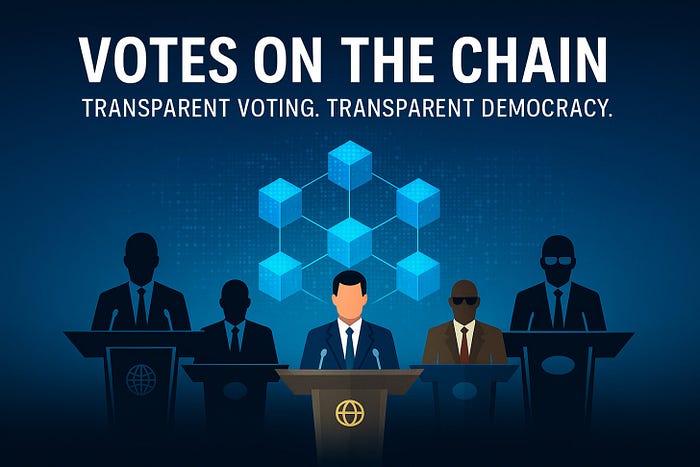Votes on the Chain: Why Every Political Decision Should Be Recorded on Blockchain

Disclaimer:
The following are my own opinions, not those of my employers or associates.
Why we need this
In modern democracies, citizens place enormous trust in elected officials. Yet the systems that hold them accountable, from legislative voting to public transparency, are neither as simple nor as visible as they could be. What if we could make the process radically more transparent?
What if every vote by a politician, every stance, and every change in position were publicly visible, permanent, and easy to explore? That is what happens when you combine two technologies: a voting system recorded on blockchain and a user interface that allows citizens to explore political records intuitively. Add to that the potential for prediction markets and open data, and you have a system that is not only transparent but also analytically rich.
In short: record every politician’s vote on blockchain, build a clear public interface, and use the resulting data for forecasting and accountability.
How it could work
Here is how it might look in practice:
- Each politician receives a unique digital identity or wallet. Their votes are recorded as transactions on a blockchain ledger. Because a blockchain is a distributed database where many computers store the same record, once a vote is logged it cannot easily be changed. (Blockchain Council)
- Citizens can access a simple website or app that links each politician’s identity to their voting history. Anyone can scroll or filter by issue and see how consistently a politician has voted.
- When a politician changes their stance, that becomes instantly visible. Transparency is automatic.
- The structured data can support prediction markets and research. Platforms like Polymarket already allow users to predict outcomes of real-world events, including elections. (CoinTelegraph)
- Over time, this creates stronger accountability, better civic engagement, and more reliable data for forecasting.
Are people doing this already
Yes, but only partially.
Existing efforts:
- Research and pilot projects are exploring blockchain-based voting for secure and transparent elections. (Analytics Insight)
- Political prediction markets like Polymarket already use public data to forecast outcomes. (CoinTelegraph)
- Academic studies have proposed blockchain-based voting systems that balance anonymity, scalability, and security. (arXiv)
What no one has fully built yet is a system that combines public politician voting records on blockchain with an accessible citizen interface and forecasting capabilities.
Is the technology ready
Mostly yes, though not without challenges.
What is straightforward:
- Blockchain records are inherently transparent and difficult to alter. (Investopedia)
- A public ledger allows anyone to verify results independently. (Political Media)
- Prediction and analytics platforms already handle large data sets.
The challenges:
- Identity and authenticity: Votes must come from verified politicians, not impostors. That requires digital identity systems. (Debut Infotech)
- Privacy versus transparency: Citizens may want anonymity while politicians should have open records. That balance requires careful design.
- Scalability: Legislative voting produces large data volumes that blockchains must process efficiently.
- Legal and political adoption: Implementing a national voting infrastructure requires legislation and cross-party consensus.
- Prediction market regulation: Forecasting markets must operate within clear financial and legal frameworks. (Blockonomi)
So while the technology exists, scaling it securely and legally remains the real challenge.
Why this matters
- Simplicity: Citizens can easily see how politicians vote and how consistent they are.
- Accountability: Flip-flops are visible. Promises become traceable.
- Engagement: An intuitive design could make politics easier to understand and follow.
- Data value: Transparent, structured data can power analytics and forecasting, allowing journalists, researchers, and traders to assess trends.
- Trust: Public confidence grows when information is verifiable and easy to check.
Potential objections and responses
- “Blockchain is just hype.” True, it has been overused. But it is especially good at creating tamper-proof, auditable records.
- “What about privacy?” Politicians already have public voting records. Blockchain simply makes those records more accessible and verifiable.
- “Could hackers manipulate the data?” Not easily. Blockchain design distributes control, making tampering difficult. Security audits would still be vital.
- “Prediction markets sound like gambling.” In this context, prediction markets mean regulated forecasting tools, not casinos. They help aggregate collective intelligence about political outcomes.
- “Would this cost too much?” Elections already cost billions. Over time, digital verification could reduce administrative costs and increase trust. (EMB Global)
What comes next
A sensible way to start would be a pilot project:
- Select a small legislature, such as a city council or regional government.
- Record each vote by each politician on blockchain and publish the results in real time.
- Build a simple public interface that shows who voted yes, no, or abstained.
- Add visual summaries like “consistency scores” or “policy stance maps.”
- Introduce a lightweight, regulated forecasting tool for specific bills or policies.
- Measure citizen engagement, data accuracy, and overall trust in the system.
- Evaluate and expand if the pilot proves useful and secure.
Closing thoughts
Democracy deserves better tools. Technology, when used thoughtfully, can bring transparency, simplicity, and accountability. This is not about replacing politics or people. It is about giving citizens a clearer view of how their representatives act and making that data accessible and meaningful. By recording politician votes on a blockchain, building the right interface for citizens, and adding analytics or markets on top, we may not solve every problem, but we move a real step closer to a more open and participatory democracy.
References
- Digital Democracy Forum: How Blockchain Technology Could Transform Politics
- Political Marketer: Blockchain-Based Voting Systems for Politics
- Analytics Insight: Blockchain Voting Systems and Election Integrity
- Blockchain Council: Blockchain-Based Voting Systems
- Debut Infotech: Building Secure Blockchain Voting Systems in 2025
- The Blockverse: How Blockchain Technology Is Used in Voting
- CoinTelegraph: Can Polymarket and Augur Predict Election Outcomes
- Grayscale Research: Polymarket Election-Year Analysis
- Political Media: Blocks, Chains, and Ballots
- Digital Democracy Forum: Advancements in Blockchain Voting and E-Voting Systems
Listen To The Article

Black Friday 30%
Offer









